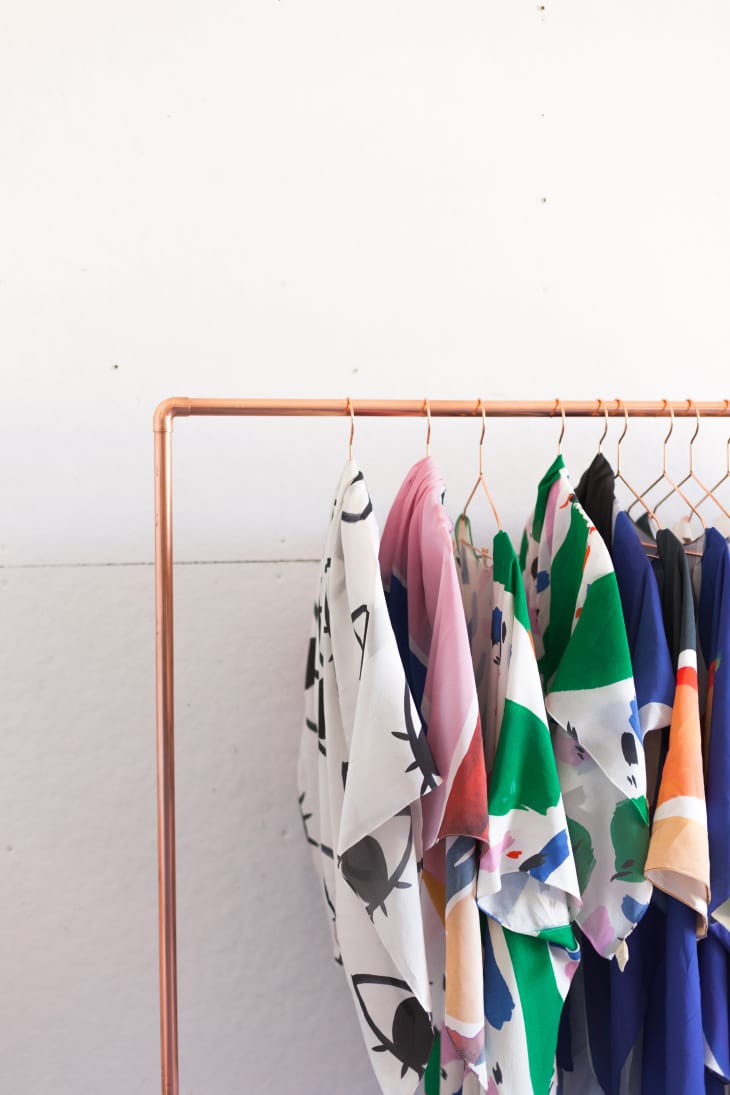9 Things You Should Always Take to the Dry Cleaners (And 5 Things You Really Don’t Need To)

Instructions are important to pay attention to, especially when it’s laundry time. You might think that measly little tag inside your favorite sweater doesn’t offer any sound advice, but in reality, the future of your wardrobe might depend on it. You see, many of us take the words “Dry-Clean Only” as a slight suggestion, when they need to be read literally (should you want to preserve the life of your garments). And yet, just because a tag recommends dry-cleaning (i.e. the word “only” isn’t present) doesn’t mean you have to take it to the cleaners. It’s confusing, I know, but the distinction is significant nonetheless.
To help make your laundry life a bit easier, we compiled a list of items that should always be taken to the dry cleaners, as well as a roundup of ones that can be handled at home. Of course when in doubt, a good cleaner will let you know if bringing your things in is really necessary.
What Goes to the Cleaners
1. Anything that’s embellished
Because embellishments (such as sequins, beads, and metal studs) are often hand-stitched to clothing or simply hanging by a thread, putting them through a wash cycle will likely end in disaster. For a deep clean that won’t jeopardize the details, drop your bedecked stuff off at the dry cleaners.
2. Dark colored silks
Although some silks can endure a solid hand-wash, darker-colored ones have a tendency to bleed and stain clothes and surfaces. Try wetting a small patch of the silk and blotting it dry with a white paper towel; if it leaves any color behind, take it to the cleaners.
3. Suits
When spot cleaning doesn’t do the trick, it’s time to take your suits—especially your wool ones—to the dry cleaners. Not only will it keep your pants and jacket looking extra crisp, it will add years to their life.
4. Anything with pleating
There’s no doubt about it: If an item has pleating, it’s got to go to the dry cleaners. Not only can the professional preserve your folds and pleats, most have re-pleating machines that can rescue any receding ones when necessary.
5. Super-stained items
No matter how stained or soiled your comforter may be, it’s nothing a professional cleaner can’t handle. Along with powerful degreasers, soaps, and solvents, your local dry cleaner is trained in the art of impossible stain removal.
6. Fragile or synthetic materials
Even though some labels will say they’re safe to hand wash, fragile synthetic fabrics like rayon and chiffon are known to shrink when exposed to heat, and as a result, are best left in the hands of a pro.
7. Anything with a lining
An easy rule of thumb to remember is that anything with a proper lining—dresses, jackets, skirts, etc.—needs to be dry cleaned. Because water alone can break apart their interlinings, your lined garments should only be trusted with a professional.
8. Leather and suede
While some will argue that you can wash it at home, for your beloved leather jacket’s sake, just drop it off at the dry cleaners. Along with reducing the chance of cracks and shrivels in the fabric, you won’t have to worry about major shrinkage.
9. Furs
Although wearing animal fur is a subject of fierce debate, any fur that has skin on the underside should not be washed at home since the skin will shrink and dry out when exposed to water. Additionally, vintage furs (like mink coats or fox stoles) are very delicate and can become dry and brittle, and therefore should be handled by a professional only.
Things You Can Wash Yourself at Home
1. Linen and cotton
As long as they aren’t embellished, these fabrics can be washed in the washing machine. However we suggest using either warm or cool water when doing so, since heat can cause colors to fade quicker.
2. Cashmere and other fine-haired wools
Dry cleaning chemicals can be harsh, that’s why soft, natural fibers like cashmere and mohair should be hand washed at home. Be sure to use a mild detergent (or even shampoo) and rinse with cool water to ensure these delicate items will last longer.
3. Durable synthetic fibers
When it comes to cleaning stronger synthetic knits such as polyester, acrylic, and nylon, hand washing—or on the delicate cycle (with cold water) in the washing machine—will work wonderfully. Just remember to lay flat or hang dry to avoid permanent wrinkling.
4. Light colored silks
Assuming they don’t bleed (see how to test above) most light-colored silks can be hand-washed at home in the sink. However as per usual, if you’re unsure, leave it up to the professionals.
5. Denim
Believe it or not, taking your jeans to the dry cleaners will often leave you with a starchy, overly creased mess. If you know your denim can handle a machine wash, go with that. If not, turn your denim inside out and soak in lukewarm bathtub water with a color-safe detergent for 45 minutes, then rinse in cool water and hang dry.
Do you have any laundry vs dry cleaner tips to share? Differing opinions or experiences to add? Questions about specific things we didn’t address above? Let us know in the comments…